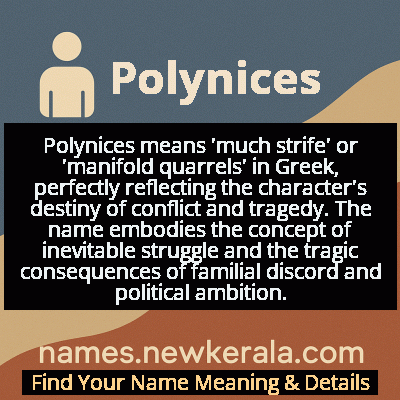Polynices Name Meaning & Details
Origin, Popularity, Numerology Analysis & Name Meaning of Polynices
Discover the origin, meaning, and cultural significance of the name POLYNICES. Delve into its historical roots and explore the lasting impact it has had on communities and traditions.
Name
Polynices
Gender
Male
Origin
Greek
Lucky Number
1
Meaning of the Name - Polynices
Polynices means 'much strife' or 'manifold quarrels' in Greek, perfectly reflecting the character's destiny of conflict and tragedy. The name embodies the concept of inevitable struggle and the tragic consequences of familial discord and political ambition.
Polynices - Complete Numerology Analysis
Your Numerology Number
Based on Pythagorean Numerology System
Ruling Planet
Sun
Positive Nature
Leaders, ambitious, highly driven, self-reliant, innovative.
Negative Traits
Overly aggressive, domineering, impatient, selfish.
Lucky Colours
Red, orange, gold.
Lucky Days
Sunday.
Lucky Stones
Ruby, garnet.
Harmony Numbers
2, 3, 9.
Best Suited Professions
Entrepreneurs, managers, engineers.
What People Like About You
Courage, determination, leadership.
Famous People Named Polynices
Polynices of Thebes
Mythological Prince
Central figure in the Seven Against Thebes conflict; son of Oedipus who fought his brother for the Theban throne
Polynices (Aeschylus)
Tragic Hero
Protagonist in 'Seven Against Thebes'; symbol of fraternal conflict and political ambition in Greek drama
Polynices (Sophocles)
Literary Figure
Central off-stage character in 'Antigone' whose burial dispute drives the play's moral conflict
Name Variations & International Equivalents
Click on blue names to explore their detailed meanings. Gray names with will be available soon.
Cultural & Historical Significance
The cultural impact of Polynices extends beyond ancient Greece into Western philosophical and political thought. His unburied body in 'Antigone' raises fundamental questions about natural law versus human law, individual conscience versus state authority, and the limits of political power. Throughout history, his story has been invoked in discussions of civil disobedience, the rights of rebels, and the moral obligations of family. The figure of Polynices continues to resonate in modern times as a symbol of how personal ambitions and political conflicts can destroy families and states alike, serving as a perpetual warning about the costs of unresolved conflict and the importance of reconciliation.
Extended Personality Analysis
The name Polynices suggests a personality marked by intense determination, political ambition, and a strong sense of personal justice. Individuals with this name are likely to be natural leaders with strategic minds, capable of organizing complex endeavors and inspiring loyalty in followers. However, they may also exhibit a stubborn adherence to their principles and a tendency toward confrontation when their rights or honor are challenged. The mythological association implies someone who fights passionately for what they believe is rightfully theirs, even when this leads to conflict with family or established authority.
These individuals typically possess deep convictions about fairness and inheritance rights, often seeing themselves as defenders of proper order and tradition. They may demonstrate exceptional courage in adversity but could struggle with flexibility and compromise. The tragic element of the name suggests that while they may be morally justified in their pursuits, their methods or timing might lead to unfortunate consequences. There's often a nobility to their struggles, even when they end in tragedy, indicating someone who would rather fight for principle than accept what they perceive as injustice. Their personality combines elements of the heroic leader with the tragic figure doomed by their own virtues taken to extremes.
Modern Usage & Popularity
In contemporary naming practices, Polynices remains an extraordinarily rare choice, primarily confined to academic circles, literary references, or families with specific interest in Greek mythology. The name sees virtually no usage in mainstream birth records due to its strong association with tragic conflict, complex pronunciation, and the weight of its mythological baggage. However, it maintains a presence in cultural discourse through university classics departments, theatrical productions of Greek tragedies, and modern literary retellings of mythological stories. The name occasionally appears in fantasy literature and games as a character name that immediately signals classical tragedy and heroic conflict. While not a practical choice for most parents, it serves as an important cultural reference point and continues to be studied and referenced in discussions about fate, family conflict, and political legitimacy in Western literature and philosophy.
Symbolic & Spiritual Meanings
Polynices symbolizes the eternal tension between legitimate authority and righteous rebellion, representing the tragic cost when personal ambition and familial duty collide. His story serves as a powerful metaphor for civil conflict, where both sides may have valid claims but the struggle itself becomes destructive. The unburied Polynices represents unresolved issues, denied recognition, and the consequences of failing to reconcile competing rights and honors. Symbolically, he embodies the principle that some conflicts cannot be resolved through compromise alone, and that the pursuit of justice can sometimes lead to tragedy.
The name also carries deeper symbolic meanings about inheritance, legitimacy, and the nature of political power. Polynices represents the claimant whose rights are denied, making him a symbol of dispossession and the struggle for restoration. His fate speaks to the importance of ritual closure and proper burial rites, symbolizing how societies must acknowledge and process conflict to achieve peace. The brother-against-brother dynamic makes him an emblem of internal division—whether within families, nations, or even within individual consciousness—where competing aspects of identity or principle struggle for dominance.

